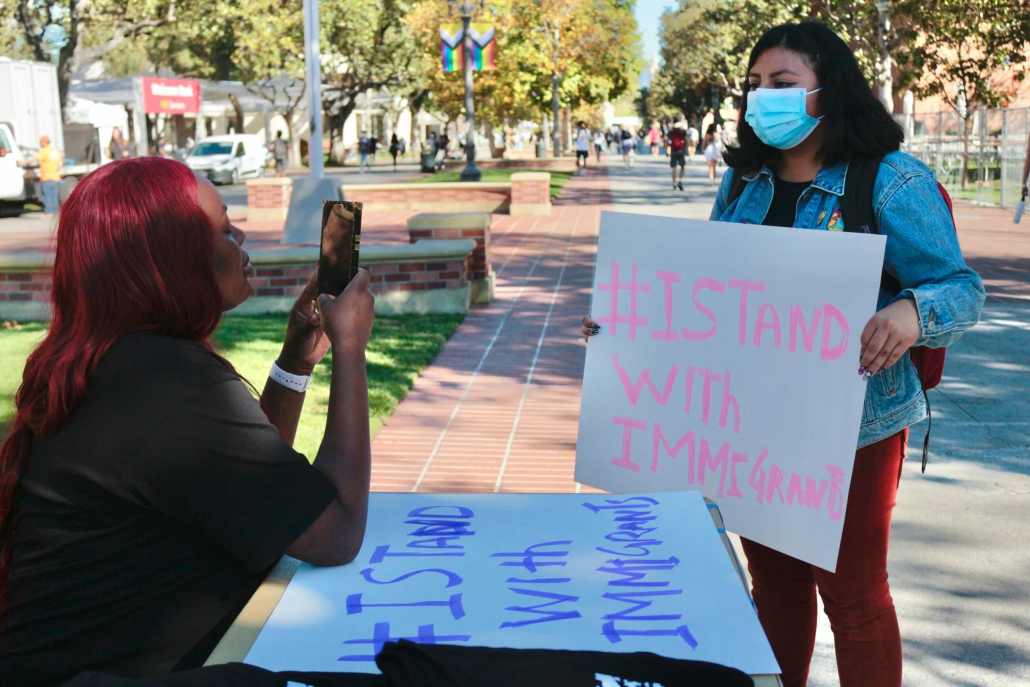Students recognize immigrant Day of Action

Jamie Cabrera, a graduate student at the Suzanne Dworak-Peck School of Social Work, has lived in the United States for the majority of her life after immigrating to the U.S. as a baby. (Sasha Ryu | Daily Trojan)
Members of the Graduate Student Government handed out T-shirts at a table set up with two large posters reading “I stand with immigrants” at Hahn Plaza Thursday. The event aimed to celebrate immigrants’ achievements, bring awareness to their contributions to the United States and advocate for policy changes to support immigrants for the I Stand with Immigrants College & University Day of Action.
According to its website, the I Stand With Immigrants Initiative, powered by FWD.us, “empower[s] immigrants and their allies to share stories and drive action that demonstrate immigration is good for our communities, economy, and country.”
Ramatoulaye Ouattara, a graduate student studying molecular microbiology and immunology at Keck School of Medicine, was one of the organizers as the director of globalization and inclusion in GSG. Ouattara, an immigrant herself, moved from Côte d’Ivoire to New Jersey as a teenager.
“I decided to be part of this position because it is my way of giving back,” Ouattara said. “It is my way to advocate for immigrants, for [Deferred Action for Childhood Arrival] students, for international students for them to be able to know that there’s somebody that’s standing beside them, somebody that is willing to help them.”
Ouattara is an advocate for DACA, a policy that allows undocumented individuals brought to the U.S. as children to work in the country. Although Ouattara does not know any USC DACA recipients personally, she wants to find out how she can support this community, especially on their journey to citizenship.
Pratik Nyaupane, a doctoral student at the Annenberg School for Communication and Journalism, came to support the initiative because one of the founders of the I Stand With Immigrants campaign was a guest speaker in his civic media class. Nyaupane, an immigrant as well, came to the U.S. when he was three years old on his parents’ student visa.
“While I’m fortunate enough to have privilege, to have a certain status, I know a lot of my peers don’t. For a lot of young children that come here at a young age, this is the only place they know, their family’s here, this is their home,” Nyaupane said. “It’s terribly unfortunate and cruel for the United States or other people or policies to say that this is not where you’re from, or not where you belong, just because of a piece of paper and so I stand in solidarity with all my undocumented folks.”
Nyaupane said he hopes that community and solidarity can form in support of undocumented students. He said he is willing to create space and promote dialogue about these issues for real change to happen.
In Ouattara’s experience, she faced hardships, such as bullying, when her family came to the U.S. as refugees in the midst of Côte d’Ivoire’s civil war. She said it was tough to learn a new language, go to a new school and leave most of her family back home.
“I was a ninth grader. I never experienced bullying or any other type of thing back home. But, then, when I came here it was like, ‘You’re having an accent,’ ‘You’re being different,’ then people feels like it is a threat to them,” Ouattura said. “But I ended up having some friends that stood up for me, I will say.”
Jamie Cabrera, a graduate student at Suzanne Dworak-Peck School of Social Work, came to the U.S. as a baby and was previously undocumented. After living in the U.S. for the majority of her life, Cabrera found that navigating higher education was particularly difficult because of the lack of services and resources available to undocumented families.
“First and foremost, the [U.S.] was founded on the work of immigrants,” Cabrera said. “Coming here isn’t an easy decision. Nobody wants to come over and just be discriminated against and … hurt in every situation … We should just be empathetic and understanding and take some time to listen to people’s stories.”
Cabrera said obtaining a lawyer to start the immigration process is difficult and expensive, which can make the legal process a “huge strain” on low-income families.
“I became a citizen when I was 21,” Cabrera said. “I had been declined citizenship twice, so it was really [hard] going to court and having to explain why you belong here is always really weird for anybody to do.”
Growing up, Cabrera went to a predominantly white public school in northern California. Sharing her immigration status with her peers was not always a positive experience for her; she said people told her “If you’re undocumented, you shouldn’t be able to access public schools in the U.S. because you don’t belong here.”
Cabrera believes it is important to host events like I Stand With Immigrants so immigrants with different experiences can be comfortable, unafraid and have a place in the U.S.
“I think it’s important to have events like this, especially [at] USC, where it’s a predominantly white institution,” Cabrera said. “Things like this show support to the different populations, diverse populations that we have here on campus.”

